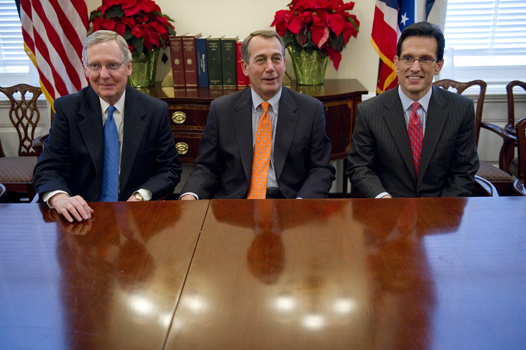Since taking the majority — and even before that — Republicans have been at pains to explain away a problem they’ve seen coming for months: the fact that CBO and most analysts find that repealing the health care law will cost money. Big money. But they have a separate, less appreciated problem.
Today, CBO forecast that the 10-year cost of repealing health care reform is actually $230 billion. That’s nearly $100 billion higher than one might have expected, given that just under a year ago, the same budget analysts concluded that the Affordable Care Act would reduce the deficit by $143 billion in the first decade.
And if the CBO’s projections for the law hold, the cost of repeal will grow larger and larger the longer the law stays in effect.
CBO’s initial cost estimate of the health care law — the $143 billion in additional revenue that its various cost-cutting and revenue-raising measures would bring to the Treasury — covered the impact of the bill between its enactment and the end of 2019. But the CBO also predicted that in the second decade, as cost cutting, spending, and revenue measures take fuller effect, the bill’s deficit reducing impact would increase dramatically. One year later, and the 10-year window takes us into that second decade, when the health care law will bring more money in.
Here’s the relevant passage from the initial cost estimate explaining this.
The difference in the time horizons for the cost estimates will also differentiate the estimate for H.R. 2 from that for PPACA and the Reconciliation Act. The budgetary horizon for legislation considered in 2011 will span the fiscal years from 2011 through 2021, two years beyond the period covered by the cost estimate for the enacted legislation. Extrapolating the budgetary effects for 2019 of PPACA and the health care provisions of the Reconciliation Act, CBO anticipates that enacting H.R. 2 would increase federal budget deficits by a total of roughly $80 billion to $90 billion over the 2020-2021 period. Consequently, over the 2012-2021 period, the effect of H.R. 2 on federal deficits as a result of changes in direct spending and revenues is likely to be an increase in the vicinity of $230 billion, plus or minus the effects of technical and economic changes to CBO’s and JCT’s projections for that period.
So the $230 billion the government is expected to lose if the GOP push to repeal the health care bill is successful only gets us through 2021. And, if the CBO is right about the law’s long term impact on the deficit, then Republicans will have an even bigger revenue loss problem on their hand if they try to repeal the law again next year — or, worse, in the next Congress — because each year that passes brings the CBO one further year into that second decade.
This isn’t just a time bomb waiting to go off, but a series of ever larger time bombs. Today, House Speaker John Boehner dismissed the CBO’s findings out of hand.
“I do not believe that repealing the job-killing health care law will increase the deficit,” he said. “CBO’s entitled to their opinion, but they’re locked within constraints of the 1974 Budget Act.”
But that will get much harder to say if the cost estimates for repeal grow more and more unfavorable. Republicans have their work cut out for them.










